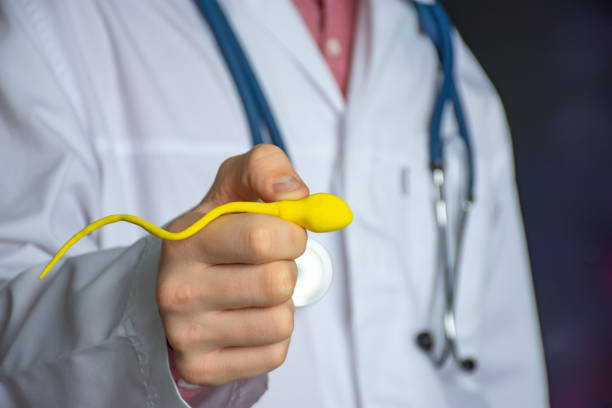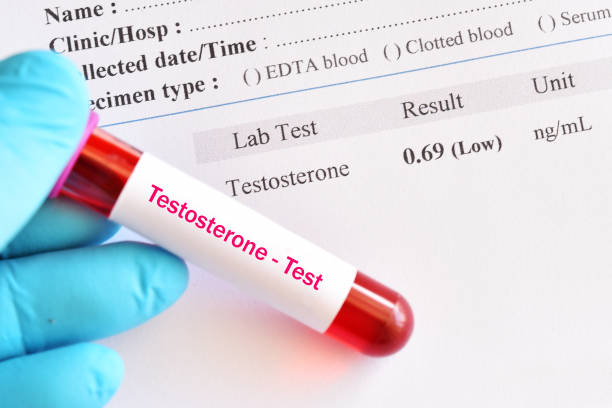Health, Men’s Health, Reproductive Health
Ways to Boost Male Fertility and Increase Sperm Count
Male infertility is a prevalent problem for many couples around the world. Low sperm count is one of the most common reasons of male infertility, and it can be caused by a variety of factors including lifestyle choices, environmental variables, and underlying medical issues. Fortunately, there are numerous methods for increasing male fertility and sperm count, which can improve the odds of conception. In this article, we will look at different techniques to boost your sperm count, the importance of sperm in fertility, and factors influencing sperm production.

Understanding Male Fertility
Male fertility is determined by the amount and quality of sperm generated. Sperm are male reproductive cells that fertilize a female’s egg and produce an embryo. Understanding the significance of sperm in conception and the factors that influence sperm production is critical for men seeking to conceive.
The Role of Sperm in Fertility
Sperm have an important function in male fertility. A healthy sperm count is required for effective fertilization of the female egg. To fertilize an egg, sperm must be able to swim through the female reproductive canal. Additionally, the sperm must be able to enter the egg’s protective covering in order to form an embryo.
Factors Affecting Sperm Production
Several factors can influence sperm production, including lifestyle choices, medical issues, and environmental exposure. Some of the most common factors are:
- Age: As men age, their sperm count and quality decline.
- Smoking can lower sperm count and motility.
- Alcohol: Excessive drinking might reduce testosterone levels and impair sperm production.
- Obesity: Being overweight or obese might lower sperm quantity and quality.
- Medical disorders, such as diabetes and varicoceles, might impair sperm production.
- Environmental factors: Toxins, radiation, and certain chemicals can all have an effect on sperm production.
Men can enhance their chances of conception by knowing the role of sperm in fertility and the factors that influence sperm production. Making good lifestyle choices, getting medical care, and avoiding environmental pollutants can all assist to improve male fertility and sperm count.

Dietary Changes to Boost Fertility
Making dietary modifications can help improve male fertility and sperm count. Here are some crucial nutrients to include and avoid.
Key Nutrients for Sperm Health
Certain nutrients are necessary for sperm health. This includes:
- Zinc is essential for sperm production and motility. Oysters, steak, poultry, almonds, and beans are good sources of zinc.
- Folic Acid: Folic acid prevents birth abnormalities and improves sperm quality. Foods high in folic acid include leafy green vegetables, beans, and fortified cereals.
- Vitamin C: Vitamin C is an antioxidant that protects sperm from harm. Citrus fruits, berries, kiwi, and peppers are excellent sources of vitamin C.
- Vitamin D: Vitamin D promotes testosterone production and sperm quality. Vitamin D is found in fatty fish, egg yolks, and fortified foods, but it is best obtained from sunlight.
Foods to Include
Including specific items in your diet can also assist to increase male fertility. This includes:
Fish: Fatty fish like salmon, tuna, and sardines contain omega-3 fatty acids, which can boost sperm count and motility.
Berries include antioxidants, which can help prevent sperm from harm.
Nuts: Nuts include zinc and other elements that are beneficial to sperm health.
Leafy green foods, such as spinach and kale, provide folic acid and other elements that can help enhance sperm quality.
Foods to Avoid
Certain meals and habits can have an adverse effect on male fertility. This includes:
Alcohol: Excessive drinking might reduce testosterone levels and sperm production.
Processed meats: Bacon and sausage are high in saturated fat, which can reduce sperm count and motility.
Soy products include phytoestrogens, which may interfere with testosterone production.
High-mercury species, such as sharks and swordfish, have been shown to harm sperm.

Lifestyle Modifications
Exercise and Weight Management
Male fertility relies heavily on regular activity and a healthy weight. Obesity has been associated to lower sperm count and poorer sperm quality. Exercise can enhance blood flow and oxygenation to the testicles, increasing sperm production. It is advised to engage in moderate activity for at least 30 minutes every day, most days of the week. This can involve brisk walking, jogging, and riding.
Stress Reduction Techniques
Stress can have an adverse effect on male fertility by lowering testosterone levels and sperm production. Meditation, yoga, and deep breathing exercises are all effective stress-reduction approaches. These approaches can help reduce stress and boost overall well-being.
Sleep Quality and Duration
Getting enough quality sleep is essential for male fertility. Lack of sleep has been linked to low testosterone levels and poor sperm quality. It is advisable to strive for 7-8 hours of sleep per night and to stick to a regular sleep routine. Creating a calming sleep environment and limiting screen time before bedtime can also help enhance sleep quality.
Incorporating these lifestyle changes can boost male fertility and sperm count. However, before adopting any big lifestyle changes, you should consult with a healthcare practitioner.

Medical Interventions
Hormonal Treatments
Hormonal therapies are commonly used to boost sperm count and improve male fertility. These treatments work by restoring hormonal balance, which might alter sperm production and quality. Testosterone replacement therapy is a common hormonal treatment that can help enhance sperm production in men with low testosterone levels. Other hormonal therapies may include drugs like clomiphene citrate, which can promote hormone production and sperm release.
Assisted Reproductive Technologies
Assisted reproductive technologies (ART) are medical therapies that can assist couples dealing with infertility. These technologies can include procedures like IVF and ICSI. IVF involves fertilizing an egg outside of the body and then transferring the embryo to the uterus. ICSI entails inserting a single sperm directly into an egg to fertilize it. Both of these procedures can benefit men who have low sperm counts or poor sperm motility.
It is crucial to emphasize that, while medical procedures can help improve male fertility and sperm count, they are not always required. Lifestyle improvements like as maintaining a healthy weight, stopping smoking, and limiting alcohol use can also improve male fertility. In addition, natural vitamins like CoQ10 and vitamin D may help increase sperm quality.
Environmental Factors
Exposure to Toxins
Toxin exposure has been linked to decreased male fertility and sperm count. Chemicals such as pesticides, lead, and other environmental contaminants can harm sperm and diminish their count. Men who work in industries that expose them to chemicals should take extra care to keep themselves safe. Wearing protective clothing and washing your hands frequently can assist to limit the danger of exposure.
Temperature and Radiation
High temperatures and radiation can also have an adverse effect on male fertility. Men who routinely utilize hot tubs or saunas may have lower sperm counts due to the higher temperatures in those situations. Radiation exposure, such as from x-rays, can potentially harm sperm and diminish their count. Men should restrict their exposure to certain environmental elements in order to maintain a healthy sperm count.
Overall, decreasing toxins and regulating temperature and radiation exposure can improve male fertility and sperm count.

Supplements and Vitamins
Antioxidants
Antioxidants are molecules that protect the body from oxidative stress, which can harm sperm and diminish fertility. Some of the best antioxidants for male fertility are:
- Vitamin C: This nutrient is necessary for sperm health and can boost sperm count, motility, and structure. Vitamin C-rich foods include citrus fruits, berries, kiwi, and peppers.
- Vitamin E is a powerful antioxidant that helps protect sperm from harm and boost fertility. Nuts, seeds, and leafy green vegetables are good sources of vitamin E.
- Selenium: This mineral is necessary for sperm formation and can increase sperm count and motility. Brazil nuts, fish, and whole grains are good sources of selenium.
Herbal Supplements
Herbal supplements can also help enhance male fertility. Some of the most common herbs for male fertility are:
- Maca: This root vegetable is widely used in traditional medicine to increase fertility. It can boost sperm count, motility, and sexual function.
- Ashwagandha: This herb is widely used in Ayurvedic medicine to boost fertility. It can boost testosterone levels and improve sperm count and motility.
- Tribulus terrestris: This herb is widely used in traditional medicine to boost male fertility and sexual performance. It can boost testosterone levels and improve sperm count and motility.
It is crucial to remember that, while supplements and vitamins might help improve male fertility, they should not be utilized in place of a nutritious diet and lifestyle. It is also critical to consult a healthcare expert before beginning any new supplement program.

Monitoring Sperm Health
Regular Check-ups
Regular check-ups with a healthcare provider can help monitor sperm health and detect potential problems early on. During a check-up, the healthcare professional may inquire about your lifestyle choices, medical history, and do a physical examination. They may also request a semen study to determine sperm count, shape, and motility.
At-Home Testing Kits
There are also at-home testing kits available for monitoring sperm health. These kits usually entail collecting a sperm sample and sending it to a lab for analysis. Results are often available within a few days and can include information about sperm count, shape, and motility.
It is crucial to note that at-home testing kits may be less accurate than testing performed in a healthcare provider’s office. Additionally, if any anomalies are discovered, it is critical to consult with a healthcare expert for additional examination and treatment options.
Overall, monitoring sperm health is a critical step toward increasing male fertility and sperm counts. Regular check-ups with a healthcare provider, as well as at-home testing kits, can provide useful information and aid in the early detection of any concerns.

Avoiding Negative Habits
Specific lifestyle decisions can have a negative impact on male fertility. Avoiding bad habits is critical for increasing sperm count and fertility. Here are some of the bad habits that men should avoid.
Reducing Alcohol Consumption
Excessive alcohol use might have a negative impact on male fertility. Alcohol can impair the quality and amount of sperm, as well as hormone levels. Men seeking to conceive should limit their alcohol consumption to two drinks per day.
Quit Smoking
Smoking is another practice that might have a negative effect on male fertility. Smoking can harm sperm DNA and lower sperm counts. It can also impair sperm motility and morphology. Men who smoke should quit to improve their chances of conceiving.
Limiting Recreational Drug Use
Recreational drug use may also have a negative effect on male fertility. Drugs like marijuana and cocaine can lower sperm count and motility. Men who take recreational drugs should limit their use or stop entirely.
Men can increase their fertility by avoiding unfavorable habits.
Conclusion
In conclusion, the pursuit of ways to boost male fertility and increase sperm count is a journey that combines lifestyle choices, dietary habits, and proactive health measures. The factors influencing male fertility are multifaceted, and adopting a holistic approach is key. From maintaining a balanced diet to managing stress and avoiding harmful habits, men can take proactive steps to enhance their reproductive health. Consulting with healthcare professionals for personalized advice is crucial, but the overarching message is clear: by embracing a healthy lifestyle and making informed choices, men can play an active role in optimizing their fertility and contributing to the journey of starting or expanding a family.
Journey of self discovery


